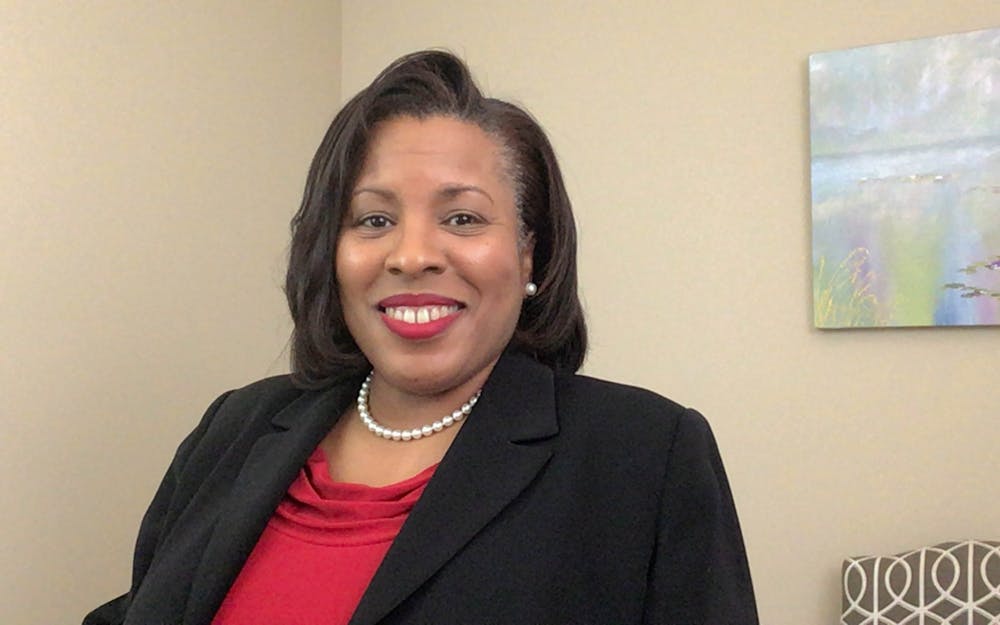Anderson Thompkins said she has gotten to see McDonald’s commitment to inclusion over her time at UNC.
“Dr. McDonald, I have known personally since she was a graduate student here,” Anderson Thompkins said. “And I think it's especially meaningful to have Dr. McDonald recognized because she is part of our inaugural UNC Diversity, Equity and Inclusion Council.”
As director of diversity, equity and inclusion in the Hussman School, McDonald spearheads initiatives to make classrooms more inclusive and to ensure that students become more culturally competent through curriculum, outside activities and career opportunities.
“In my role as the director of diversity, equity and inclusion, it's sort of full circle for me, because I'm not just teaching it, I'm helping implement it in the school,” McDonald said. “I'm helping to foster a sense of belonging for students, for staff, for faculty in the school, and creating programming to present an opportunity for everyone to be involved.”
Anderson Thompkins said while McDonald now has the role of director of diversity, equity and inclusion, she has been leading the conversation in Hussman since long before she earned the title.
“And really, even through her research, she has made this the focus of her career," Anderson Thompkins said. "Her research focuses on civil rights. And it's ironic that she would get the MLK Unsung Hero Award because MLK has really shaped a lot of her career.”
McDonald said receiving the award serves as a signal of the work she is doing and the important focus that the University is taking on diversity, equity and inclusion.
“It shows that we are, number one, paying attention to what's going on and realizing the importance of it, as well as just hopefully creating opportunities for us to just ignite and continue to ignite the conversation around racial and social justice,” McDonald said.
Khalilah R. Johnson
Johnson was the first African American doctoral student in occupational science at UNC, earning her degree in 2016.
“The first thing that comes to mind is that, at the time that I graduated, why are there firsts?” Johnson said. “It's mind blowing, honestly, to be the first Black anything in this day and age. I am a sort of like a walking example of how far we still need to go.”
Johnson’s perspective on her own experiences is reflected in her work and research at UNC and beyond. She is an associate professor in the UNC School of Medicine’s Division of Occupational Science and Occupational Therapy and affiliate research faculty member at the Virginia Commonwealth University Center for Cultural Experiences in Prevention.
To get the day's news and headlines in your inbox each morning, sign up for our email newsletters.
“In my discipline, the ways it impacts my work is sort of automatically taking up the torch to it and to ensure that we are not just diverse in my profession, but inclusive and just and anti-racist as well,” Johnson said.
Johnson uses social media, conferences, teaching, research and other platforms to advocate for inclusivity within occupational science. She conducts research on the treatment of racially marginalized individuals living with intellectual and developmental disabilities.
“As a professor, she is really the driving force to diversify the discipline and field as well as their curriculum,” Anderson Thompkins said.
Johnson said that receiving the MLK Unsung Hero Award was unexpected and humbling.
“I really see awards and accolades as a challenge to be better for the next thing,” Johnson said. “So it's like you've been recognized sort of at this level, how am I going to level up?”
Moving forward in her work, Johnson said she sees her greatest impact in her students.
“But what I've come to realize, though, is that when we as in academics or practitioners who are also academics, use our platforms to really bring to light issues that I think people tend to shy away from, that students and practitioners tend to not just hold on to it — but are inspired by it and mobilize around their own efforts,” she said.
university@dailytarheel.com



